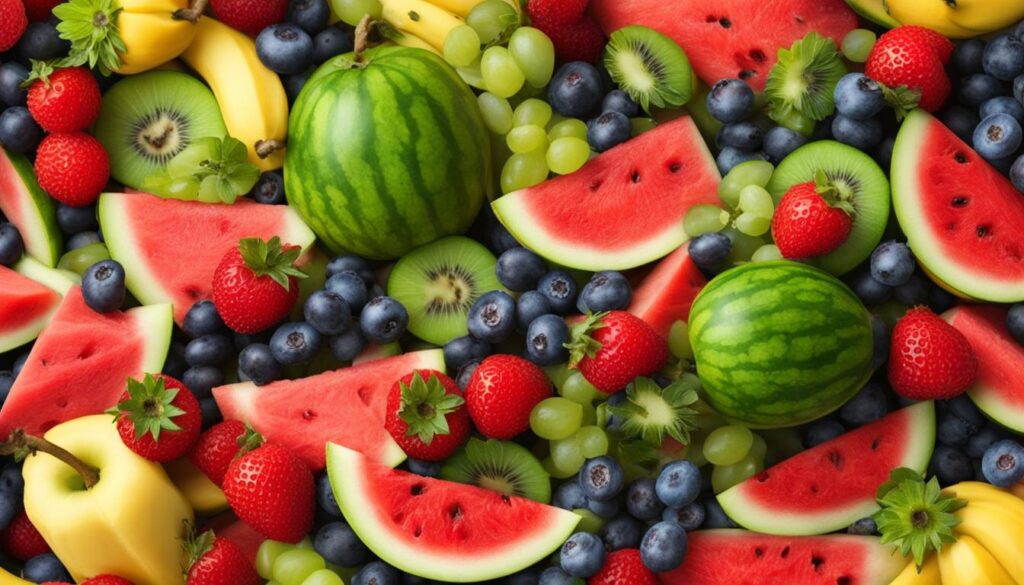Curious about whether strawberries are a safe and healthy treat for your furry friend? You’re not alone! Many dog owners wonder if dogs can enjoy the juicy sweetness of strawberries. Well, the answer is yes, but there are some important considerations to keep in mind.
Strawberries offer a range of nutritional benefits for dogs. They are packed with antioxidants, fiber, and vitamin C, which can help with the aging process, strengthen the immune system, and even aid in weight management. Additionally, feeding strawberries to your dog can contribute to dental health, promoting a fresh and healthy smile.
However, it’s crucial to remember that moderation is key. While strawberries are generally safe for dogs, it’s important to serve them in small quantities and avoid options with added sugar or artificial sweeteners. As always, consulting with your veterinarian before introducing any new food to your dog’s diet is essential.
Key Takeaways:
- Strawberries can be a healthy and low-calorie treat for dogs.
- They are packed with antioxidants, fiber, and vitamin C, which support the aging process, immune system, and weight management.
- Feeding strawberries to dogs can contribute to dental health.
- However, serve strawberries in moderation and avoid options with added sugar or artificial sweeteners.
- Consult with a veterinarian before introducing any new food to your dog’s diet.
How to Safely Feed Strawberries to Your Dog
When it comes to serving strawberries to your furry friend, it’s important to prioritize their safety and well-being. Follow these precautions to ensure your dog can enjoy this delicious fruit without any harm.
Washing and Preparing Strawberries
Before serving strawberries to your dog, make sure to wash them thoroughly to remove any dirt, pesticides, or herbicides. This will help eliminate any potential toxins that could be harmful to your dog’s health. Additionally, cut the strawberries into small, digestible pieces to prevent choking. For smaller dogs or older dogs with dental issues, consider mashing or pureeing the strawberries to make them easier to consume.
Avoiding Added Sugars and Artificial Sweeteners
When offering strawberries to your dog, it’s important to avoid options with added sugars or artificial sweeteners. These can be harmful to their health and may lead to digestive issues or other adverse reactions. Stick to fresh strawberries and avoid canned or syrup-coated varieties, as they often contain excessive sugar and additives that are not beneficial for your dog’s well-being.
Start with Small Quantities and Monitor Your Dog
Introduce strawberries to your dog’s diet gradually and start with small quantities. Observe their behavior and digestive system for any changes or adverse reactions. Every dog is unique, and some may have sensitivities or allergies to certain foods. If you notice any negative symptoms or your dog doesn’t tolerate strawberries well, discontinue feeding them and consult with a veterinarian for guidance.
By following these safe serving practices, you can ensure that strawberries are a tasty and healthy treat for your canine companion.
Nutritional Benefits of Strawberries for Dogs
When it comes to the health benefits of strawberries for dogs, there’s more than just their delicious taste. These vibrant red fruits are packed with essential nutrients that can support your dog’s overall well-being.
Antioxidants for Reducing Inflammation
Strawberries are rich in antioxidants, such as anthocyanins, that help combat free radicals in your dog’s body. These antioxidants can reduce inflammation, which is beneficial for dogs with conditions like arthritis or allergies. Including strawberries in your dog’s diet can contribute to their overall joint and skin health.
Fiber for a Healthy Digestive System
Strawberries are also a great source of fiber, which is essential for maintaining a healthy digestive system. The fiber content in strawberries can aid in regulating bowel movements and preventing constipation. It can also contribute to weight management by promoting feelings of fullness without adding excess calories to your dog’s diet.
Vitamin C for Immune Support and Skin Health
Vitamin C is another key nutrient found in strawberries. This vitamin is known for its immune-boosting properties, helping your dog’s body fight off infections and stay healthy. Additionally, vitamin C plays a vital role in collagen production, which is essential for maintaining healthy skin and coat for your furry friend.
| Nutrient | Amount per 100g of Strawberries |
|---|---|
| Fiber | 2 g |
| Protein | 0.7 g |
| Vitamin C | 58.8 mg |
| Potassium | 153 mg |
| Calcium | 16 mg |
| Iron | 0.4 mg |
| Magnesium | 13 mg |
| Phosphorus | 24 mg |
| Vitamin K | 2.2 µg |
With these impressive nutritional benefits, strawberries can be a healthy addition to your dog’s diet. However, it’s essential to feed strawberries in moderation and always consult with your veterinarian before introducing any new food into your dog’s diet.
Potential Risks of Feeding Strawberries to Dogs
While strawberries can be a healthy treat for dogs, there are some potential risks to be aware of. One of the main concerns is the choking hazard that strawberries can pose, especially for smaller dogs. The size and texture of strawberries can make them difficult to swallow, so it’s important to cut them into small, digestible pieces before feeding them to your furry friend. This will help prevent any choking incidents and ensure their safety.
Another risk to consider is the potential for excessive sugar intake. Strawberries may be naturally sweet, but they still contain sugar, which can lead to stomach upset and digestive issues if consumed in large amounts. It’s important to remember that dogs have different dietary needs and metabolisms than humans, so moderation is key when it comes to feeding them strawberries or any other sweet treats.
Additionally, it’s crucial to wash strawberries thoroughly before feeding them to your dog. Strawberries, like other fruits, can contain pesticide residues that may be harmful to dogs if ingested. By washing them properly, you can remove any potentially harmful substances and ensure the safety of your furry friend.
Choking Hazard of Strawberries for Dogs
Dogs, especially smaller breeds, may have difficulty swallowing whole strawberries due to their size and texture. The round shape of strawberries can pose a choking hazard if not properly cut into smaller pieces. It’s important to remember that dogs have different anatomical structures than humans, and what may be a small bite for us could present a choking risk for them. By cutting strawberries into safe, bite-sized pieces, you can help prevent any potential choking incidents and ensure your dog’s well-being.
Excessive Sugar Intake for Dogs
While strawberries are a natural source of sweetness, they still contain sugar. Dogs have different dietary needs than humans, and consuming excessive amounts of sugar can lead to various health issues. Overconsumption of sugary foods, including strawberries, can contribute to weight gain, dental problems, and digestive issues in dogs. It’s important to provide strawberries to your dog in moderation and as part of a balanced diet to prevent any adverse effects from excessive sugar intake.
| Potential Risks | Prevention Tips |
|---|---|
| Choking hazard | Cut strawberries into small, digestible pieces |
| Excessive sugar intake | Feed strawberries in moderation as part of a balanced diet |
| Pesticide residues | Thoroughly wash strawberries before feeding them to your dog |
Safe Consumption Guidelines for Strawberries
When it comes to feeding strawberries to your dog, following safe consumption guidelines is crucial. Ensuring that the strawberries are clean and prepared properly can help prevent any potential issues. Here are some guidelines to keep in mind:
- Thoroughly wash the strawberries to remove any dirt, pesticides, or herbicides that may be present. This step is important for your dog’s safety and wellbeing.
- Cut the strawberries into small pieces to prevent any choking hazards, especially for smaller dogs. This will make it easier for your furry friend to enjoy the treat without any risks.
- If you have an older dog or a dog with dental issues, consider mashing the strawberries or pureeing them. This will make the strawberries easier to consume and digest.
- For a cool and refreshing summer treat, you can freeze the strawberries. This can be a delightful option for your dog, especially on hot days.
Remember, it is important to consult with a veterinarian before introducing strawberries or any new food to your dog’s diet. This is especially crucial if your dog has any health conditions that could potentially be affected.
By following these guidelines and prioritizing your dog’s wellbeing, you can safely incorporate strawberries into their diet as a tasty and healthy treat.

Table: Safe Consumption Guidelines for Strawberries
| Guideline | Description |
|---|---|
| Wash Thoroughly | Remove any dirt, pesticides, or herbicides by washing the strawberries before serving them to your dog. |
| Cut into Small Pieces | Reduce the risk of choking by cutting the strawberries into small, bite-sized pieces. |
| Mash or Puree | If your dog has dental issues, consider mashing or pureeing the strawberries to make them easier to consume. |
| Freeze for a Treat | During hot weather, you can freeze strawberries to provide a refreshing and enjoyable treat for your dog. |
“Following safe consumption guidelines ensures that your dog can reap the benefits of strawberries without any risks. By washing them thoroughly, cutting them into small pieces, and considering alternative preparations, you can confidently serve strawberries as a healthy treat.”
Other Fruits for Dogs
In addition to strawberries, there are several other fruits that are safe for dogs to eat in moderation. Adding a variety of fruits to your dog’s diet can provide them with different nutrients and flavors. Here are some safe and healthy fruits you can consider feeding your furry friend:
- Apples: Rich in vitamins A and C, as well as fiber.
- Bananas: A great source of potassium and vitamin B6.
- Blueberries: Packed with antioxidants and vitamin C.
- Cantaloupe: A hydrating fruit that is high in vitamins A and C.
- Cranberries: Can help promote a healthy urinary tract.
- Cucumbers: A low-calorie and hydrating option for dogs.
- Mangoes: Contains vitamins A, C, and E.
- Oranges: Rich in vitamin C and can aid in digestion.
- Peaches: A good source of vitamins A and C.
- Pears: High in fiber and vitamin C.
- Pineapples: Contains bromelain, which can help with digestion.
- Pumpkins: Can help with digestive health and provide fiber.
- Raspberries: High in antioxidants and fiber.
- Watermelons: A hydrating fruit that is safe for dogs.
When introducing new fruits to your dog, it’s important to do so gradually and in moderation. Observe your dog’s reaction and make sure they don’t experience any digestive upset. Always remove any seeds, pits, or rinds that could be harmful to your dog. Consulting with a veterinarian can provide additional guidance on incorporating fruits into your dog’s diet.
Remember, while fruits can be a healthy addition to your dog’s diet, they should never make up the majority of their meals. A balanced diet that includes protein, carbohydrates, and fats is essential for their overall health and well-being. Enjoy exploring different fruits with your furry companion, and remember to prioritize their dietary needs and preferences.

Conclusion
In conclusion, strawberries can be a wonderful addition to your dog’s diet when served in moderation. These tasty berries offer numerous nutritional benefits, including antioxidants, fiber, and vitamin C. Incorporating strawberries into your dog’s meals can assist in maintaining a healthy immune system, promoting digestion, and supporting dental health.
However, it’s essential to be mindful of potential risks associated with feeding strawberries to dogs. The size and texture of strawberries can pose a choking hazard, so it’s important to cut them into small, manageable pieces. Additionally, strawberries contain natural sugars, so excessive consumption can lead to digestive issues. Washing the strawberries thoroughly is crucial to remove any harmful pesticide residues that may be present.
To safely introduce strawberries into your dog’s diet, consult with your veterinarian and follow the recommended guidelines. Start with small portions and monitor your dog’s reaction for any signs of discomfort or adverse effects. Remember, every dog is unique, and what works for one may not work for another. Always prioritize your dog’s well-being and adjust their diet accordingly.
Overall, strawberries can be a delightful and nutritious treat for your four-legged friend. With proper precautions and moderation, you can enjoy sharing this delicious fruit with your dog, providing them with a tasty and healthy addition to their diet.
FAQ
Can dogs eat strawberries?
Yes, dogs can eat strawberries in moderation.
What are the nutritional benefits of strawberries for dogs?
Strawberries are packed with antioxidants, fiber, and vitamin C, which can help with the aging process, strengthen the immune system, and aid in weight management.
Are there any considerations for feeding strawberries to dogs?
Yes, it is important to serve strawberries in moderation, avoid options with added sugar or artificial sweeteners, and consult with a veterinarian before introducing any new food to your dog’s diet.
How can I safely feed strawberries to my dog?
It is recommended to wash strawberries thoroughly, cut them into small, digestible pieces, and avoid options with excessive sugar or artificial sweeteners.
What are the potential risks of feeding strawberries to dogs?
The size and texture of strawberries can pose a choking hazard, and excessive consumption of strawberries, which are naturally high in sugar, can lead to stomach upset and gastrointestinal issues in dogs.
What are the safe consumption guidelines for strawberries?
Thoroughly wash strawberries, cut them into small pieces, and consult with a veterinarian before introducing them to your dog’s diet.
Can dogs eat other fruits?
Yes, there are several other fruits that are safe for dogs to eat in moderation, such as apples, bananas, blueberries, cantaloupe, cranberries, cucumbers, mangoes, oranges, peaches, pears, pineapples, pumpkins, raspberries, and watermelons.
What is the conclusion on feeding strawberries to dogs?
Strawberries can be a nutritious and delicious treat for dogs when served in moderation, but it is important to consider the potential risks and consult with a veterinarian.





